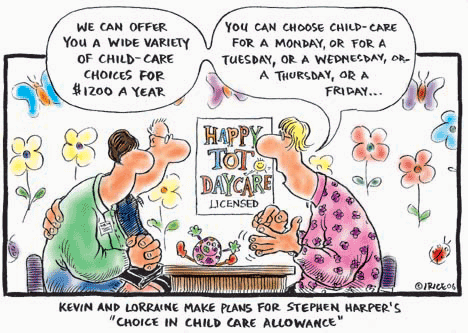
The issue of child care was never properly communicated to the Canadian public and Stephen Harper's Conservative government knows this. Whether as a result of a misguided comment about beer and popcorn, or the effective political branding of parents as the number one child experts in Canada, the true details of both the Tory policy and the Liberals' recently cancelled plan have never properly penetrated the public consciousness with any kind of depth.
So, here is an attempt to have a frank discussion about policy specifics rather than political bluster and spin.
The Conservatives have promised a taxable grant of $1,200 for each child under six, as well as 125,000 daycare spaces over the next five years through an annual $250 million Community Childcare Investment Program.
During the 2004 federal election campaign, the Liberals promised $5 billion to create 250,000 child care spaces by 2009. Subsequently, the 2006 campaign saw a commitment by Paul Martin for an additional $6 billion to finance the program through to 2015.
Liberal fine print
Now before we get to the inadequacy of the Conservative plan, we need to be honest and offer a reality check with regards to some of the Liberals past claims. The Martin campaign publicly estimated during the election that the plan would create 625,000 new child care spaces. But it is clear that the 250,000 spots will not be magically expanded by 350,000 as a result of a simple extension of the $1 billion per year until 2015. This is particularly evidenced when you examine how many total child care spaces currently exist in the country, a number that stood at a mere 600,000 in 2001 (providing a national access ratio of 1 in 8 children).
The best model of child care that this country has to offer parents is the one that has been established in Quebec. In 1997, Quebec introduced its own day care system, offering spaces at $5 a day. Demand quickly surpassed supply and the amount charged to parents was upped to $7 a day. As of 2001, Quebec had 235,000 spaces available, providing access for 1 in 5 children. If we do the basic math, a $7 a day program translates into a cost of $140 a month per child for care for the average 20-day work month. So in Quebec, the families of 1 out of every 5 children will be very pleased with the Conservative plan.
The rest of the country? Well, that equation isn't as easy to rationalize. Here are the monthly daycare costs in different regions across the country, as researched by Runzheimer International:
DAYCARE AVERAGE MONTHLY COSTS: Most Expensive Nationwide
Chatham (Ontario) $825.83
Ottawa $749.67
Toronto $722.88
Kitchener $651.67
London $640.00
Yellowknife $606.67
According to Statistics Canada findings from 2001, only about 47 percent of children are looked after by a parent in this country. The remaining 53 percent receive external forms of child care, including staying with relatives (1/3), receiving care from non-relatives in someone else's home (1/3), formal enrollment in a daycare centre (25 percent) and being taken care of by a babysitter (9 percent).
So in all fairness, only 13.5 percent of children would be targeted by the Liberal plan on daycare, even though that percentage would marginally increase as a result of new spaces being created.
Canada's bad report card
On the other hand, $1,200 per child means that formal daycare for most children across the country is still out of the question. To be honest, it likely wouldn't even cover the costs of adequate babysitting services.
In October 2004, the Organization for Economic Cooperation and Development released a report that described Canada's child care system as a chronically underfunded patchwork of programs with no overarching goals. It found that many centres were shabby and many workers were poorly trained. Staff turnover at many centres was very high.
The report also found a shortage of available, regulated child care spaces - enough for fewer than 20 percent of children aged six years and younger with working parents. In the U.K., 60 percent of children find regulated child care; in Belgium, 63 percent; in France, 69 percent; in Denmark, 78 percent.
What it would take
The truth of the matter is, this country is lagging far behind many other industrialized nations when it comes to child care. To meet OECD recommendations that Canada boost its child care spending to the OECD average of about 0.4 percent of the Gross Domestic Product, we would have to spend approximately $4 billion per year.
Neither the Tory or Liberal plans come anywhere close to that mark.
Even the NDP 2006 platform only offered $1.8 billion for the first year and $2.5 billion after four years, figures which still do not meet the abovementioned international suggested standards.
Why can Stephen Harper threaten to go to the polls over this issue, as he did yesterday? Simply for the fact that no party has a policy that is going to make parents enthusiastic about going back into another election.
Former federal Liberal advisor Jonathan Ross runs TDH Strategies consulting. ![]()














Tyee Commenting Guidelines
Comments that violate guidelines risk being deleted, and violations may result in a temporary or permanent user ban. Maintain the spirit of good conversation to stay in the discussion.
*Please note The Tyee is not a forum for spreading misinformation about COVID-19, denying its existence or minimizing its risk to public health.
Do:
Do not: